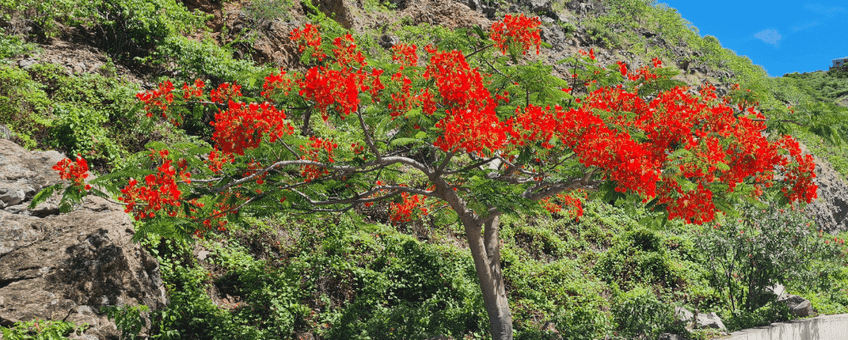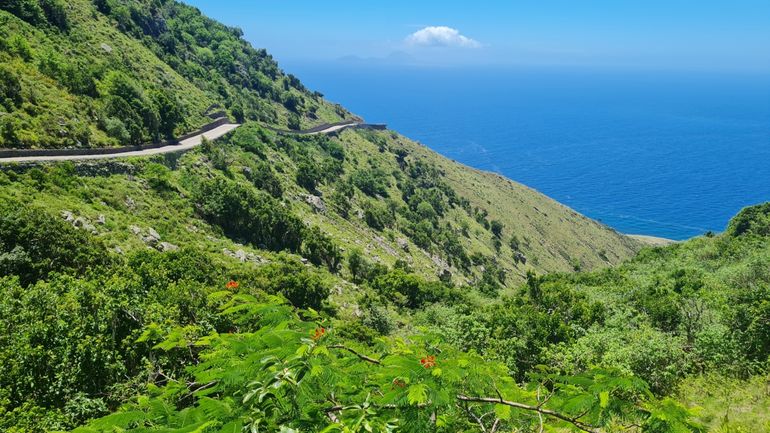
Reviving wild forests to enhance food security
Dutch Caribbean Nature Alliance (DCNA), Public Entity SabaPlanting over 5000 trees will help Saba secure not only a more beautiful and greener island but provide fresh fruits and vegetables to locals and providing hands on opportunity to learn more about reforestation techniques. This project is in alignment with the strategic goals and targets of the Caribbean Netherlands Nature and Environment Policy Plan 2020 – 2030 (NEPP).
Goals and targets
Over the years, Saba’s tropical and dry forests have been negatively impacted by hurricanes, less rainfall as a result of climate change and roaming goats. This has resulted in high levels of erosion throughout the island and limited the expansion of existing forests. The goal of this project is to boost the recovery process and expand upon Saba’s existing forests in order to reduce the land-based pressures of erosion and runoff, which impact Saba’s coral reefs, and increase the availability of local food. During this three year project, 5,000 trees will be planted, of which 500 will be fruit trees. The objective is to create more habitat in order to improve terrestrial and marine biodiversity through the structural restoration and expansion of Saba’s existing dry and tropical forests and at the same time improve food security on the island. The project consists of three components: Reforestation of wild forests, beautification and local food production. Reforestation and the planting of fruit and flowering trees will take place on government lands, in public spaces, and in close consultation and collaboration with private landowners.

Wild forests and beautification
For the reforestation of wild forests, trees that are native to the island or those that have become naturalized over time will be planted at various locations throughout the island to (re)create wild forests. This is a long and slow process, as the trees will be grown from seeds. Using seeds ensures genetic diversity in the trees planted and ultimately healthy and resilient forests like those in the wild. In addition to improving biodiversity, these newly planted trees will also contribute to the beautification of the island.
Flowering trees will be used to not only beautify areas of construction, but also to create shade and cooling and enhance the wellbeing of the persons living in those areas. Numerous studies have shown that the presence of trees in urban areas positively impact the mental and physical wellbeing of the residents that live there. Beautification of the island using trees will also enhance Saba’s tourism product, which is its pristine nature.
Local food production
Most of the fruits and vegetables consumed on Saba are imported. The supply chains which make it possible for food to reach Saba are vulnerable and can be easily interrupted. This was made evident in the aftermaths of Hurricanes Irma and Maria and more recently the COVID-19 pandemic and the Russian-Ukrainian war. A first step in improving food security is the development of a hydroponics system and local food forests. These food forests will be developed for the production of fruit and some vegetables and will be located throughout the different villages of the island and in areas which are central and accessible.

Community engagement, education and awareness
Throughout this project, the community will be invited to participate through tree planting days and educational activities. Knowledge and know-how on the importance of protecting local trees will be transferred to students and members within the community through various events. Students of the primary and secondary schools will be introduced to reforestation through visits to the nursery and reforestation sites once they are up and running. Students will also be given the opportunity to shadow the reforestation rangers and take part in reforestation activities. For the local food production component of the project, workshops on the grafting of fruit trees will be held for the public to take part in. These measures ensure that the knowledge obtained during the project remains on Saba to benefit the island community and inspire the island’s youth to pursue careers in nature conservation and agriculture.
Text and photos: Public Entity Saba
